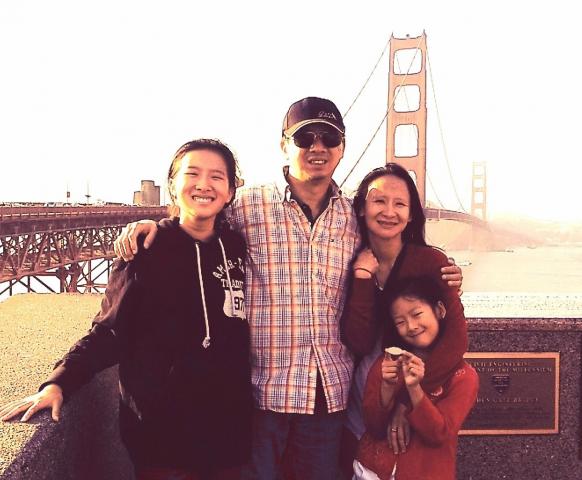



Director: Chiachih DC Wang, Ph.D.
I grew up and completed my grade school and college education in Taiwan. After working a few years as a mental health counselor in a community-based agency and as a Student Affairs supervisor at a university, I came to the U.S. in 1997 to pursue my graduate training. I received my Ph.D. in Counseling Psychology from the University of Missouri in 2004. As a cisgender, heterosexual, married man raising two daughters in the U.S., I constantly engage in self-reflection regarding what salient culturosocial factors shape who I am as a person and how my developed and ever-evolving worldview, peivileges, and ethnic/immigrant status affect my perceptions/experiences and interactions with others and the world. When not working, I like to explore new stuff, visit different places, hang out with family and friends, watch movies, and/or jog for a couple of miles.
My Primary Research Areas include adult attachment, cross-cultural variation of attachment styles and behaviors, acculturation process, cultural-ethnic-racial identity development, impacts of parent-child relationship quality and parenting on adolescents' development, and influences of cultural and contextual factors on individuals' mental health and wellness. I have completed a number of research projects examining the effects of adult attachment on a wide range of psychosocial and wellness variables (e.g., depression, anxiety, disordered eating behaviors, interpersonal conflicts, infidelity, relationship satisfaction, wellbeing, health, help seeking, etc.). I continue to pursue international research and training collaborations with colleagues in the U.S., UK, Pakistan, Taiwan, China, Thailand, Japan, and South Korea. Many of my publications focus on underrepresented and/or marginalized populations, including racial/ethnic minorities, LGBT, immigrant populations, and international students. Please see below for examples of some recent journal article publications and click here to see a more complete list from my C.V.
Examples of Some Recent Publications (* students or formal students; # international colleagues):
Jin*, L., Wang, C. D., Bismar*, D., Carbajal*, I., & Zhu*, W. (2023). A decolonial perspective of collective coping in the adult attachment and life satisfaction link. Journal of Multicultural Counseling & Development. Advance online publication.
Wang, C. D., Jin*, L., Han#, G., Zhu*, W., & Bismar*, D. (2022). Cross-cultural differences in adult attachment and depression: A culturally congruent approach. Journal of Counseling Psychology, 69(3), 298-310.
Sun#, Q., Wang, C. D., Du#, S., Biderman, M. D., & Jiang#, G. (2022). Separating the effects of attachment figure-domain units in the IPPA-R using the correlated trait and correlated method minus one model. Journal of Social and Personal Relationships, 39(4), 974-995.
Wang, C. D., Anderson*, E., & Jin*, L. (2022). Adult attachment, maladaptive coping, alcohol consumption, and drinking-related problems. Counselling Psychology Quarterly, 35(1), 43-60.
Ponciano*, C., Wang, C. D., & Jin*, L. (2022). Attachment, acculturative stress, and mental health of Mexican Immigrants. Counselling Psychology Quarterly, 35(2), 381-396.
Wang, C. D., Carbajal*, I., Barajas-Munoz*, I. A., Julio*, K., Gomez*, A., Trummer*, M., & Scalise*, D. A. (2021). Adult attachment, acculturation, acculturative stress, and psychological distress of first-generation Latinx Immigrants. Counselling Psychology Quarterly. Advance online publication.
Bismar*, D., & Wang, C. D. (2021). Mental illness stigma and help-seeking attitudes of students from immigrant families. Journal of College Counseling, 24(2), 146-163.
Wang, C. D., Lei*, Y., & Jin*, L. (2021). Adult attachment, filial piety, and interpersonal functioning of Chinese young adults. Counselling Psychology Quarterly, 34(1), 37-53.
Wang, C. D., Jin*, L., & Zamudio*, G. (2021). Adult attachment, personality factors, social support, and acculturative stress of international students. International Journal for the Advancement of Counseling, 43(1), 31-47.
Zhu*, W., Wang, C. D., Jin*, L., & Lu#, T. (2021). Adult attachment, sacrifice, and emotional wellbeing of couples: A cross-cultural comparison between the U.S. and China. Journal of Social and Personal Relationships, 38(2), 482-503.
Wang, C. D., Wang#, Y.-F., & Sun#, Y. (2020). Evolvement, current status, and cultural modifications of cognitive behavioral therapy in China and Taiwan. The Behavior Therapist, 43(2), 59-66.
Shelton*, A., Wang, C. D., & Carbajal*, I. (2020). Attachment and wellness among Latinx immigrants: Meaning-in-life, belonging, and hope as mediators. The Counseling Psychologist, 48(7), 986-1015.
Zamudio*, G., Wang, C. D., & Jin*, L. (2020). Adult attachment, social self-efficacy, familismo, and psychological wellbeing: A cross-cultural comparison. The Counseling Psychologist, 48(7), 922-952.
Tse#, P.-S., Jenkins, S. R., Wang, C. D., & Gonzale, D. A. (2020). The Emotional Approach Coping Scales in Chinese: Validation, psychometric properties, and measurement invariance. Assessment, 27(7), 1562-1574.
Wang, C. D., & Ciftci, A. (2019). Connecting social justice and international competencies: Positioning counseling psychologists for the global era. The Counseling Psychologist, 47(4), 608-629.
Wang, C. D., Hayslip, B., Sun#, Q., & Zhu*, W. (2019). Grandparents as the primary care providers for their grandchildren: A cross-cultural comparison of China and US Samples. International Journal of Aging and Human Development, 89(4), 331-355.
Current Projects: I am directing the Cross-cultural Attachment Research Lab (CARL) which includes both doctoral and undergraduate students as research assistants (RA). Currently three CARL research projects are progressing at various stages examining different topics and populations.
(1) the moderated mediational effects of particular cultural factors on the relations of adult attachment and individuals' psychosocial functioning: A cross-cultural comparison.
(2) parent-child relationship, acculturation and accultural gap, cultural and national identity, and psychosocial development of adolescents and young adults from immigrant families: A multi-dimensional investigation.
(3) adult attachment, personality traits, resiliency, contextual factors, and psychosocial adjustment of international students and foreign workers: A multi-country investigation.
Besides being involved in CARL projects at different levels, all RAs are also working on their own thesis, dissertation, or independent research projects.
Join the Lab
Doctoral students. I generally accept 1-2 new doctoral students every year into the Counseling Psychology program at UNT. Depending on the students' interests and the available slots, my students may be admitted into one of the three cirriculum-based clusters (Child & Family, Minority Wellness, and Sport Psychology ). Please see the Mentoring Style area for more information about my expectations and typical work with students.
Undergraduate lab members. I usually conduct interviews in spring/summer semester to select 1-2 new undergraduate students if there are anticipated spots opening due to graduation. Due to the mentoring model I use for undergraduate students, all undergraduate lab mebers are expected to stay in the lab for a minimun of 1.5 years (3 long semesters). Undergraduate lab members are required to purchase a B.S. degree with the honors thesis completion. If you are a sophomore or early junior at UNT with a GPA of 3.6 or above have interests in attachment and/or multicultural issues as well as a career goal to purchase doctoral training in Psychology, feel free to contact me.
For more information about the research lab and my research areas, feel free to contact me at dcwang@unt.edu or 940-565-2678.